
Joint Post by Reema and Singh
The Book Club recently commented on the terminology and applicability of the term ‘diaspora’ to the Punjabi community outside Punjab-and whether ‘diaspora’ can apply to a group that won’t be returning to the homeland. For more discussion of the term, check out the Book Club.
We wanted to explore that tangent a little more – the idea of returning to the homeland, and how distant of a reality it actually might be.
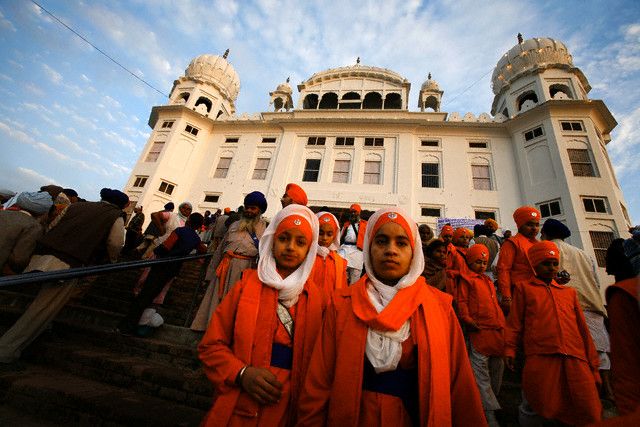
An interesting piece by an Indian-American journalist, who was born in the US and returned to India to write, explores this theme.
It was five years ago that I left America to come live and work in India. Now, in our family and among our Indian-American friends, other children of immigrants are exploring motherland opportunities. The idea is spreading virally through émigré households across the West. [Source]
You might assume that motherland opportunities for foreign-born Sikhs are in the cities – in Bangalore, Mumbai, Delhi, and Chandigarh. And if you’re thinking of business opportunities, that might be true. But Sikhs are drawn to Punjab for a number of reasons: for humanitarian work, community building activities, and unique educational experiences. With a growing number of international organizations like United Sikhs, and in the past Fateh offering opportunities for work and study in Punjab; academies like MiriPiri Academy in Amritsar LINK and Akal Academy at Baru Sahib (in neighboring HP); and foreign universities offer programs tailored to those interested in connected or reconnecting with Punjab – going back to the motherland has become easier than ever.
Last week we actually had a conversation about the book (thanks RT!) and hopefully this week will continue the dialogue. Sorry for the delay in getting this up, airline delays are tough. Here we continue….
———————————————————–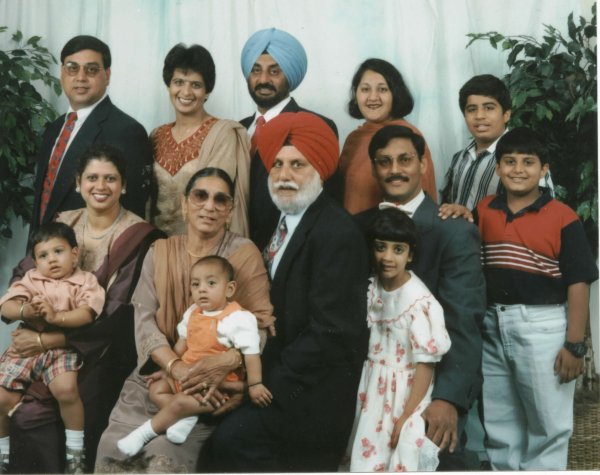
The chapters of this section probably also warrant separate blog posts as we tackle the subjects of Chapter 7 (“Employment and Education” and Chapter 8 (“Family, Gender and Sexuality”). Still time and space constricts us.
Chapter 7 looks at the employment and education profile of the Sikhs in greater detail than previously mentioned in Chapter 3. The authors note that the followers of Guru Nanak have done well in the UK, but by no means are they ‘ethnic high flyers’ (145).
Entering the UK job market as door-to-door tradesmen (Sikh Bhatras of the 1930s/40s) and followed by post WWII unskilled manual labourers, Sikh enclaves formed where employment opportunities were available. First jobs for newly arrived immigrants were facilitated by previously settled kith and kin.
Labour exploitation at the hands of factory managers and even intermediaries from their own community (batoos) helped to propel the labour movements led by the IWAs.
Gotta love Kim Bolan. For years, the Sikh-Canadian community’s favourite journalist has gotten tremendous mileage from the monikers “moderate” and “fundamentalists” that she has used to describe the BC’s Sikh population. Now, in her reporting of the Guru Nanak Sikh Temple’s election, she’s created a new segment of Sikhs: the “orthodox youth”.
Orthodox youth group sweep all executive positions at Surrey Sikh temple (Link)
I guess just saying “youth group” wouldn’t have been malicious enough. That would have brought up images of young underdog activists who chose to actually make a difference in overcoming tremendous odds in beating a slate of grey-bearded (or no-bearded) uncles who have monopolized our institutions.
Instead, she (and the Vancouver Sun) chose to stick a loaded word in front that insinuates a group that’s rigid, backwards and slightly Talibanistic. Yes, I know the word orthodox technically means “Adhering to the accepted or traditional and established faith” but the textbook definition of fundamentalist is someone who has ” a point of view characterized by a return to fundamental principles”, and that’s not how it was used over the past decade to describe observant Sikhs.
I guess Miss Bolan still has a job to do. If Sikhs actually got along and there was no controversy (real or incited), she’d have nothing to write about.
Watch out Aunties and Uncles, the bachey are taking over the gurdwara!
Surrey, BC – In a historic decision by the Sikh Community of British Columbia, the Sikh Youth slate has been elected to the management committee of Gurdwara Sahib Guru Nanak Sikh Temple in Surrey, BC.
The S
ikh Youth slate of Amardeep Singh with 18 Amritdhari GurSikh members, many of them university students who were born and raised in Canada, won by a resounding margin.
In an official statement on thier web site, the Sikh Youth slate stated:
“The members of Guru Nanak Sikh Temple, Surrey, BC have loudly declared their support for ushering in an era of groundbreaking change and reunion in the Sikh Community of British Columbia by electing the Sikh Youth slate to the management committee of one of North America’s largest historic Gurdwaras.
The entire Sikh Youth campaign wishes to express our heartfelt congratulations to the global Sikh community on this historic achievement which will close divides in our community and create new paths for peace and prosperity for our youth. We could not have accomplished this victory without the hard work and dedication of the many volunteers, campaign staff, and the community who supported us throughout.
With the blessings of God and the Guru, we pledge to serve the entire community with honesty, integrity, universal love and a commitment to the truth.” [Thanks for the info Parveen!]
 I recently came across this article, which notes that the construction on a new Sikh gurdwara in the UK is near completion. The cost for the gurdwara is a staggering £11m, all of which has been financed privately by members of the Sikh community.
I recently came across this article, which notes that the construction on a new Sikh gurdwara in the UK is near completion. The cost for the gurdwara is a staggering £11m, all of which has been financed privately by members of the Sikh community.
The article compelled me to think about the growth of gurdwaras in my corner of the United States, where there are now five major gurdwaras within a radius of about 70 miles. It made me think, more fundamentally, about when, and if so under what circumstances, a gurdwara should be built in the West.
Clearly, there are threshold issues that factor into whether a gurdwara should be built, such as whether there is sufficient sangat to initially support the gurdwara and ensure that it is sustainable in the long-term, whether there is available land that is appropriately zoned and in a convenient location, etc. And clearly there are reasons other than a bursting sangat that are invoked to justify the construction of a new gurdwara, such as management conflicts or ideological differences with those in an existing gurdwara. My attention, however, is fixated on one necessary, but not sufficient, requirement with respect to whether a gurdwara should be built: the “staff,” for lack of a better term.
A new contest + award is in place for Sikhs. Who will be the Chic Sikh of the Year for 2008?
The sponsor is Sikhchic, the online magazine which promotes Sikhs in the arts (and also invites articles on an array of subjects). The nomination process is completely transparent, which make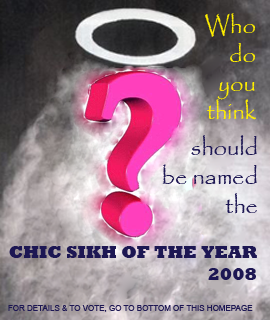 s it interesting. Anyone can nominate by simply entering a nomination and the reasons for it as a comment. It then gets posted, so you can see all of the nominations here. So far, the illustrious nominees include: Prime Minister Manmohan Singh, the Singh Twins, Fauja Singh, Amandeep Singh Madra, and I.J. Singh.
s it interesting. Anyone can nominate by simply entering a nomination and the reasons for it as a comment. It then gets posted, so you can see all of the nominations here. So far, the illustrious nominees include: Prime Minister Manmohan Singh, the Singh Twins, Fauja Singh, Amandeep Singh Madra, and I.J. Singh.
The award doesn’t have to be awarded to a Sikh. It’s unclear how much of a connection a nominee has to have to the Sikh community- whether they have to commit a Sikh-like deed or act to somehow promote/improve the Sikh community. It also doesn’t have to be to a person- it can be to an institution. There are many organizations that have done some really interesting things in the past few years for the Sikh community, and I’m sure we’ll be seeing some of them nominated.
Awards validate ideals- confirm that they mean something. It ‘s unclear so far what ideals this award will recognize since the parameters for nomination have been left purposefully vague. I guess we’ll know more when an awardee is chosen.

Recently, during a news conference in Amritsar, Rahul Gandhi reportedly condemned the widespread violence which followed his grandmother’s assassination by her bodyguards Satwant Singh and Beant Singh.
The 1984 riots were wrong, and I strongly condemn the carnage…
The comment came in response to a question about Operation Bluestar (SikhiWiki, Sikhipedia, Wikipedia),
What is interesting to me about the reporting is that the media recounting the incident has attached some great significance to the condemnation – as if it means something to the Sikh people that a member of the Gandhi family has openly denounced riots that were obviously wrong and are the cause of so much pain in the Sikh community.
I don’t know that it does. The bottom line is that Rahul Gandhi (son of former Prime Minister Rajiv Gandhi and current Congress Party President Sonia Gandhi) – like his parents, grandmother, great-grandfather, and great-great-grandfather – is a politician and I simply cannot attach much special significance to what he said. As a Sikh I don’t blame Rahul Gandhi for what happened, but I also do not excuse the fact that his father dismissed the riots with comments like “when a big tree falls, the Earth shakes” and that the Indian government has yet to put to justice those who openly instigated and condoned the massacre.
FYI, Rahul went on to explain that neither he nor his family had ill-will towards the Sikh community. Er. Thanks?… I’m sure you sense my sarcasm. So, contrary to what the Indian media may think, Rahul’s comments mean little to me.
Anyhow, I’d like to take this opportunity to promote some media that does mean something to me: The Widow Colony.
For our readers who are not familiar with the film, in short, it is a documentary that presents the stories of a group of Sikh women who lost husbands, sons, and brothers during the anti-Sikh riots of 1984. The film has won numerous accolades and if you have not yet seen it, I highly recommend that you do. And if you are in Northern California – you can see it TOMORROW evening at UC Berkeley.
- What: The Widow Colony
- Where: 2050 VLSB, UC Berkeley, Berkeley, CA 94704
- When: 7:00 pm on Thursday, November 20, 2008
For more info you can email wcberkeley@gmail.com or call 909-802-8892.
[Event poster after the break]
Coblogged by: Jodha and Mewa Singh
Well it doesn’t seem by the number of comments (0) that this first attempt at a book club garnered much interest, although by the number of hits, it has been extremely popular. Regardless, for us it has been a 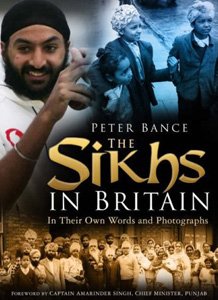 great excuse to read a great book….So we’ll continue. PS: the side picture is related to a soon-to-be-available coffee table photography book.
great excuse to read a great book….So we’ll continue. PS: the side picture is related to a soon-to-be-available coffee table photography book.
———————————————–
The two chapters read this week probably deserve separate blog posts, but still in the interest of time and space, we are going to keep them together.
Chapter 5 deals with “Homeland Politics: Class, Identity, and Party” and Chapter 6 is about “British Multiculturalism and Sikhs.”
The authors begin chapter 5 by noting that:
Associations of immigrants in Britain have generally served two functions: to facilitate the integration of the new arrivals and as conduits of homeland politics, and these functions have further strengthened with the onset of globalization, which has underpinned the rise of nationalism and diaspora movements. (94)
1984 is seen as the ‘critical’ event that intensified Sikh religio-ethnic self-identification with large numbers of Sikhs. The mammoth protest at Hyde Park on June 10, 1984 may still be vividly inscripted upon the memories of many Sikh-Britishers.
Still the associations and groups that were created to manifest this new religio-ethnic self-identification and homeland politics were along the lines of traditional associations. While there was something new in what came out of the community after 1984, there are continuities as well.
Tracing the evolution of various causes within the Sikh community, the authors note moves from the politics of class (IWAs [Indian Workers Association] up to the early 1980s), to the politics of identity (Khalistan 1984-1997), to emphasis on political organization (Sikh Political Party, UK) (94).
Over the past ten years, we’ve seen a resurgence of concern over religious accommodation for Sikh prisoners, witnesses, and the accused, in the American courts.  Four years ago a Sikh inmate starved himself to death. At the time, there were competing stories and speculation over whether this was out of shame, out of fear of being beaten by guards, or for failure to accommodate religious dietary needs.
Four years ago a Sikh inmate starved himself to death. At the time, there were competing stories and speculation over whether this was out of shame, out of fear of being beaten by guards, or for failure to accommodate religious dietary needs.
Since then, at least two recent stories reopen the situation of Sikhs asked to stand at trial or who are incarcerated. In San Jose, a judge has barred a man accused of murder from entering the court room with his turban on, arguing he could hide a noose or other weapon in it:
A San Joaquin County Superior Court judge says a Sikh man facing trial over the murder of his daughter’s former boyfriend will have to appear before jurors without his turban.Judge Charlotte Orcutt says that the long fabric pious men use to wrap their hair could hide a weapon or be used as a noose. [link]
Aside from the abject stupidity of the rationale for disallowing the turban, I was a little floored to see this rationale upheld in the South Bay Area, where there are more than enough Sikhs (including those who have appeared at trial) for the courts to have developed protocols for this, already. The issue extends beyond California, however, to other federal prisons as well:
An American Vietnam War veteran, who converted to Sikhism 20 years ago, has asked President George W. Bush to intervene in protecting the religious rights of a Sikh prisoner in Florida whose hair were cut by prison authorities. [link]
… Tarney said Jagmohan Singh Ahuja’s hair were forcibly cut by officials of the Duval County Jail in Jacksonville, Florida. Ahuja is serving a three year sentence for misdemeanour violations.
The U.S. Supreme Court ruled pretty decisively on the obligation states and the federal government have in allowing for religious practice and accommodation in 2005. What that means in practice, however, hasn’t really translated. Inmates who protested in the 2005 decision were often from “minority” or “non-mainstream” religions (e.g., white supremacists, Wiccans, practitioners of Native American spiritual backgrounds). So then why do Sikhs continue to operate under misunderstandings regarding the inherent harm or potential threat posed by religious practice? The “othering” factor is obvious and easy, but I would argue that their vulnerability is compounded by a lack of language access, lack of representation, and a tenuous relationship between non-incarcerated and incarcerated Sikh populations.
Unfortunately South East Asia’s coverage in The Langar Hall remains sparse, except for often tragic stories that make the world headlines.
Here we report on something much more pleasant.
It seems that in New Zealand, we have our first Sikh elected as a member of parliament (MP). Delhi-born businessman, Kanwaljit Singh Bakshi, won his precinct as a member of the conservative National Party, winning the immigrant-dominated Manukau East constituency in suburban Auckland.
Now I am the first to admit that I don’t know much about New Zealand’s politics, nor much about the National Party (other than that the “Nats” seemed poised to form the new government in New Zealand, after nearly a decade of Labour Party rule).
Still for some strange ethnic solidarity purpose (although I have a feeling I would have not voted for Bakshi), I do think his victory is a good thing for New Zealand in general and the Sikh community there in particular.
Coblogged by: Jodha and Mewa Singh
After a suggestion from a fellow langa-(w)riter (thanks Reema!), we are trying a more thematic approach this week instead of summation. Let’s see how it goes: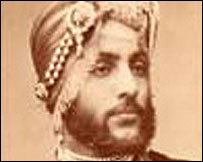
——————————————————-
Chapter 3 and 4 this week had two very different topics. The third chapter begins by looking at the movements and changes in settlement, demography, and social profiles of the Sikh-British, while the fourth chapter concentrates on institution-building within the community at its chief site, the Gurdwara.
Issues of Settlement:
The story of Sikh settlement in Britain begins with Duleep Singh, the son of Sardar Ranjit Singh. After the defeat of the Sarkar-e Khalsa by the forces of the East India Company, Duleep Singh was separated from his mother, forced to renounce all claims and much state property, and later converted to Christianity, only to later reconvert to his ancestral faith towards the end of his life. While Duleep Singh’s story is an epic in and of itself symbolic of Sikh-Anglo relations, his migration to Britain was only to be the beggining of the Sikh presence.
In the spirit of offering profiles of Sikh communities around the world, I wanted to share this article on a small but thriving Sikh community in Argentina:
The Sikhs originally came to Argentina in the early 19th century to work on a British-built railroad. Later, in the 1970s, others came after being barred entry to Canada and the United States, the preferred destinations, along with Britain, for the emigrants.
At the time, Argentina seemed the most promising of South American nations, and so they stayed, eventually concentrating in the north, which reminded them of the scrappy mountains and plains of Punjab.
Today, there are 300 of them, many of whom run supermarkets and other shops.
The article highlights the solo Sikh gurdwara in Argentina and the prevalence of interreligious marriages. The Catholic-Sikh connection parallels, in part, the history of Latino-Punjabi (Catholic-Sikh) marriages in California during the Asian Exclusion Act years. The small community fears, however, that practice will continually erode, especially with the high out-marriage rate:
Mixed marriages with Catholic Argentines are common. Although they are increasingly integrated, the temple is an emblem of their adherence to their roots….
The marriages to non-Sikh Argentines means “keeping one’s religion becomes almost impossible,” he said, adding: “I think the third generation is the one that will lose the most.”
I thought this was an interesting divergence, because other small Sikh communities in other countries continue to thrive and maintain their identity. Perhaps one of the key differences is the religious diversity among immigrants or within the country itself? (although how that would apply to Catholic Italy is an open question).
Coblogged: Jodha and Mewa Singh
First off, our sincere apologies. Due to unforeseen circumstances, this could not be published on Monday. The rest of the days will go along much better. Also, bear with us as we will get better as we go along. So Ji Aayan Nu and welcome to TLH’s 1st Book Club
—————————————————————————-
The first chapter begins with a cursory summary of Sikh history. As the authors note (and in this section you can hear Gurharpal Singh’s voice a little more prominently), much of this chapter was published in his earlier Ethnic Conflict in India.
Beginning with the Guru period, the authors note that migration is hardly a new phenomenon for the Sikhs, nor can it be said to merely be a colonial phenomenon. Selectively touching upon aspects of Sikh history, the authors draw heavily from McCleod and Grewal as the more definitive accounts. However some of the debates in the field are noted as contrary to McCleod’s position of Guru Nanak lying within a ‘Sant tradition familiar to north India’, Sikhs regard the founder of their faith as one that created a ‘new religion for a new age’ (12).
As an UPDATE to my post a couple weeks ago, the Sikh Coalition has released the “2008 Presidential Elections Voter Guide For Sikh Americans”. P.S. McCain never responded … the guide contains some of his answers collected from outside resources (the Coalition became our #1 research assistant)!
According to the Sikh Coalition:
Our candidate questionnaire was provided to both the major party candidates in November 2007. Since then, the Sikh Coalition has provided all candidates multiple and repeated opportunities to answer its questionnaire. Our Voter Guide reflects the answers of the candidates who responded to our questionnaire.
The Sikh Coalition’s Sikh American Voter Guide includes information about how and where to vote on Election Day, summaries of proposed laws that affect Sikh interests, and the presidential candidates’ answers to our questionnaire. Of the 13 candidates running for president of the United States, a total of five responded to the Coalition’s questionnaire – including one of the two major party candidates.
The 25-page guide-book has a brief biographical section on all 13 candidates running for President, along with pictures (Prabhu Singh Khasla … Ralph Nader is represented)! In addition, responses from the candidates on questions addressing:
1) Relationship With Sikhs
2) Hate Crimes
3) Religious Profiling
4) Employment Discrimination
5) Discrimination
6) Asylum
7) Immigration
Check it out! Let’s us know what you think! Make copies and get them out to your sangats at local Gurdwaras before next Tuesday!
Vote On Tuesday (11/04/2008)! You can find your local polling place through Google here!

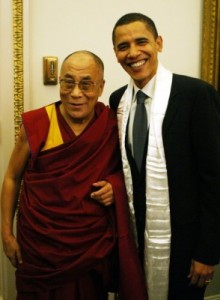 As Sundari recently noted, “[o]ver the next few weeks Sikhs will join together to celebrate the 300th anniversary of the Sri Guru Granth Sahib.” I didn’t anticipate that Sikhs would be joined by a major politician in those celebrations. To my surprise, Presidential hopeful Barack Obama (pictured here with His Holiness the 14th Dalai Lama) sent greetings to Sikhs on the 300th anniversary of the installation of the Guru Granth Sahib Ji. In the message — transmitted in a letter to the American Gurdwara Prabandhak Committee (an organization previously discussed here) — Senator Obama said:
As Sundari recently noted, “[o]ver the next few weeks Sikhs will join together to celebrate the 300th anniversary of the Sri Guru Granth Sahib.” I didn’t anticipate that Sikhs would be joined by a major politician in those celebrations. To my surprise, Presidential hopeful Barack Obama (pictured here with His Holiness the 14th Dalai Lama) sent greetings to Sikhs on the 300th anniversary of the installation of the Guru Granth Sahib Ji. In the message — transmitted in a letter to the American Gurdwara Prabandhak Committee (an organization previously discussed here) — Senator Obama said:
Throughout the world, Sikh communities are celebrating the tercentenary of the Guruship of Sri Guru Granth Sahib…. Sri Guru Granth Sahib is considered the universal spiritual leader and guiding light for the Sikh community. In 1708, Guru Gobind Singh officially ordained Guru Granth Sahib as the final and perpetual Guru of Sikhs. This worldwide celebration will commemorate the 300 years of consecration of Guru Granth Sahib and the anniversary of the accession of Guru Gobind Singh.On this momentous occasion, both Sikh and non-Sikh community members will gather together to promote [and] honour the contributions that Gurus have made to the Sikh community. [Link]
I am very pleased that a major political candidate has reached out to Sikhs and has demonstrated some familiarity with Sikh history and the importance of these celebrations in particular.
[Disclosure: In fairness, I attempted to locate any messages that Senator John McCain sent specifically to the Sikh community, but a Google search did not yield any satisfactory results. If anyone knows of any recent messages from Senator McCain to Sikhs, please provide a link in the comments section.]
I was waiting until after the election to write this post as I didn’t want my personal thoughts to be in anyway seen as promotion or endorsement.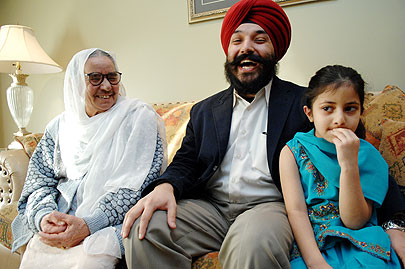
I have been a fan of Navdeep Singh Bains for many years now. I still remember his victory into the Canadian parliament as the first Amritdhari Sikh 4 years ago and I believe the youngest elected Liberal MP (26 years old) at that time. My respect for him grew, in what I believe, was his principled opposition to an overstretching then-Jathedar Vedanti on the issue of same-sex marriages.
Vedanti said he was dismayed that one MP, Ontario Liberal rookie Navdeep Bains, argued against him, but said the others listened respectfully.
“The Sikh religion would never accept such MPs,” said Vedanti. “Nobody would support such a person having such dirty thoughts in their mind because it is against the Sikh religion and the Sikh code of conduct and totally against the laws of nature.” [link]
Well many Sikhs as well as many others Canadians in the Mississauga-Brampton South riding, continue to support and ‘accept’ Navdeep. Just this month he successfully won his third term. (Vedanti on the other hand has come and gone [I have noted my criticism of the present Jathedar-obsession in a previous post])
Some ideas are just better communicated through modes other than writing. Theatre, through the unfolding of a story and through the body language of its actors, can sometimes convey meaning and ideas more effectively than just written words alone.
Some Sikh youth from Rockland, MD have decided to use theatre to engage non-Sikhs in learning about Sikhs- a wonderful idea.
Two plays are being planned for the fall expressing themes of diversity, mutual respect, interfaith and justice. They will both be staged on Saturday December 13, 2008 at the Wooten High School in Rockville, Maryland.
Where did this idea come from?
Last fall, Guru Gobind Singh Foundation had some of its kids take part in a play The Lorax, a musical adaptation from the famous Dr Seuss story book which was staged by kids from many different faiths. This play, adopted to create awareness about environment, was coordinated by the Interfaith Conference of Metropolitan Washington and was staged by the Children’s Theater Company of New York.
After going through this experience, GGSF decided to form the Rockville Chapter of Children’s Theater Company last May to explore the possibility of staging a play depicting the concepts of Guru Granth Sahib. Dedicated to “Building Character Onstage”, the Children’s Theatre Company (CTC) of New York develops in children and youth a keen sense of citizenship while introducing them to the incomparable magic of theatre through their full participation in the creation and performance of musicals and plays. [link]
 Although the title of the post sort of says it all, as I believe it is a worthwhile effort, I do want to highlight here. (In full transparency, a few members of The Langar Hall are helping to support this initiative). As the 29th annual Yuba City Nagar Kirtan soon approaches, it is great that so many Californian Sikh Students Associations (SSAs) are coming together to work with one another. I am told that this is a first effort in greater coordination and institutionalization that will be implemented in the following years.
Although the title of the post sort of says it all, as I believe it is a worthwhile effort, I do want to highlight here. (In full transparency, a few members of The Langar Hall are helping to support this initiative). As the 29th annual Yuba City Nagar Kirtan soon approaches, it is great that so many Californian Sikh Students Associations (SSAs) are coming together to work with one another. I am told that this is a first effort in greater coordination and institutionalization that will be implemented in the following years.
If your SSA is currently not on the list, find out why and place some pressure on your committee members to join the rest in this unified effort. If your school does not have an SSA, join the efforts of these Sikh students and start working to create one at your university.
Below I am enclosing the ‘invitation’ of the united All-California Sikh Students Association group. Contact information is located there as well as on their facebook website. For more uptodate information, also check-out the Sacramento State SSA website.
Some info on the Yuba City Nagar Kirtan:
DATE: Sunday November 2, 2008
TIME: 7am-5pm
LOCATION: Tierra Buena Gurdwara Sahib
CITY: Yuba City, CA
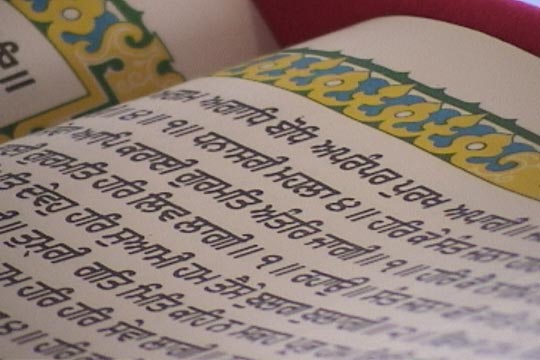 Blogged by: Mewa Singh
Blogged by: Mewa Singh
In celebrating 300 years of our Guru Granth Sahib, I thought it might be worthwhile to republish an essay I had written for the Jakara Movement‘s inaugaral issue of its J.Khronicles magazine. Hope you enjoy….
Sri Guru Granth Sahib: The History of the Sikh Soul
Based on the work of the prolific Puran Singh
As the 10th Guru breathed his last, his Sikhs asked him who would be the next leader of the Sikh Nation. Guru Gobind Singh replied that they should put their trust in the infinite wisdom of the Guru Granth and the collective leadership of the Guru Panth. Together, Granth-Panth is the final Guru of the Sikhs. While every Sunday, we bow to the Guru Granth Sahib, how many of us have ever taken the time to understand what has been gifted to us? We are told to respect the Guru Granth Sahib, but don’t even know what it contains nor even have attempted to understand?
UPDATE: Both authors – Dr. Tatla and Dr. Gurharpal Singh – said that they will participate in some capacity in our first book club. A number of well-known bloggers from some prominent websites have expressed interest as well. ORDER YOUR BOOK NOW! Only 1 week before we begin!
————————————————————
Coblogged: Jodha and Mewa Singh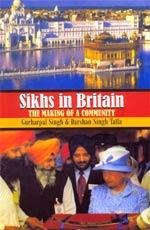
What we are about to suggest, to our knowledge has never been done before.
We are initiating the first TLH web-wide Sikh Book Club. At this point we are not sure of the frequency as we will gauge the interest from this first attempt.
What are we suggesting?
For the first book of our book club, we are suggesting a simultaneous reading of Gurharpal Singh and Darshan Singh Tatla’s Sikhs in Britain: The Making of a Community.
The two of us – Jodha and Mewa Singh – will facilitate the discussion (unless we can find someone better!). We plan to invite the authors as well as some prominent Sikh activists in our community. We hope Sikhs from all across the globe (especially UK Sikhs) will participate. Please feel free to invite others as well!
The Book:
Over the years we have read numerous academic books on the Sikhs and their history and the works of Gurharpal Singh and Darshan Singh Tatla have always been amongst our favorites. Thus, it was with great excitement that we see these two professors collaborating together. Both have an intimate knowledge of the Sikh community in England and we can think of few others that would be more able to write such a tome. This book, although focused on our brethren and sistren(?) in the UK, will provide us an avenue to delve into that section of our community, but we hope to broaden the conversation to understand other sections of our Sikh diaspora.
